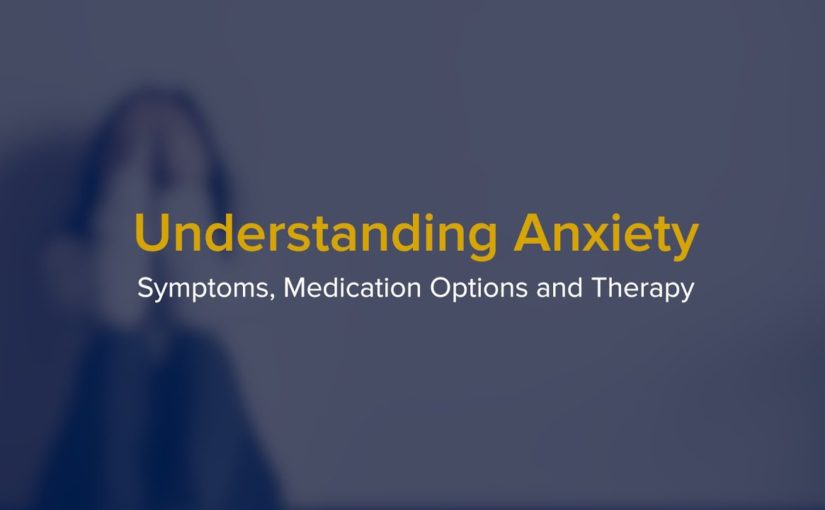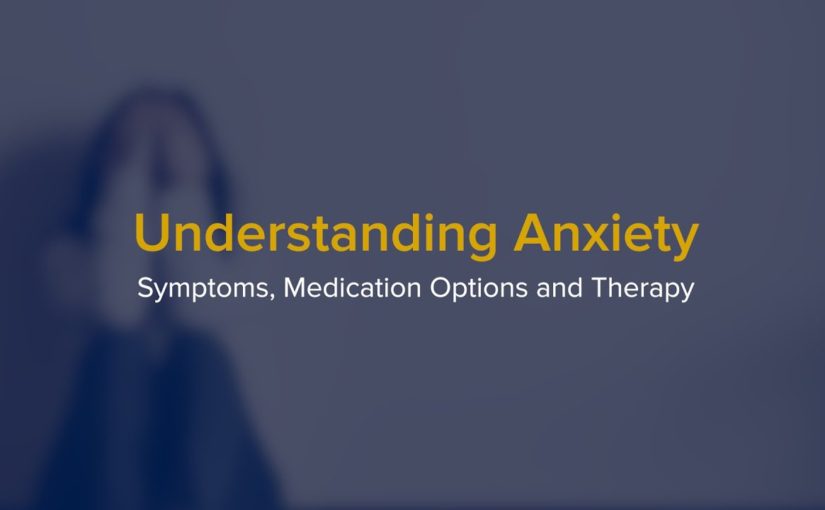Fear is
something that everybody experiences. We all have fear,
and fear is a normal response to a threat. The difference with anxiety
is that anxiety is more diffuse. It’s not specific to a threat. It’s more global and it’s more vague and general. A fear of elevators
could be rational if you know that the elevator
reached the maximum capacity or you know for sure
that it’s been failing or is shaking strangely, that’s rational, and avoiding that is normal. But anxiety would be for someone
to be afraid of elevators, even though it’s a perfectly functioning
elevator you know has been recently installed and checked and
technically is flawless, and you still have anxiety about that.Anxiety disorders are a large family
with several individual disorders, but it’s important to know
that sometimes they happen together or you may have one
and a little bit of another one. But the most common are panic
disorder, social anxiety disorder, we have also generalized anxiety
disorder, separation anxiety disorder, and the last one is selective mutism. It’s a rare disorder
that is mostly seen in children. In psychiatry,
probably the most successful group of illnesses or disorders
that we can treat successfully are anxiety disorders.
The treatment of choice is therapy. Multiple therapies are validated by research that can be effective. In addition to that,
we can use medications that are just as needed,
for example, panic attacks.Many people use a type of medication
called benzodiazepine. There’s a family of anti-anxiety medications. They can work for someone
who has only sporadic attacks, but not for someone who has chronic,
what is called generalized anxiety disorder, because it’s easy
to become dependent on those medications. The other mainstay type of treatment
in terms of medications is antidepressants, specifically the so-called serotonergic
antidepressants. Some of them, for example,
are sertraline or paroxetine and these medications
increase the transmission of serotonin in the brain and can alleviate
some of the symptoms of anxiety. When we are
thinking of treatment for anxiety disorders without medication,
we have therapy, but also we have self-help. So we can do a lot with self-help. Probably the most effective
are all kinds of activities that tend to reduce the activation of the stress response system in the body. So the stress response system releases
several chemicals, like cortisol and adrenaline,
but also changes the heart rate, breathing, and so forth. And so there are many activities,
including meditation, yoga, tai chi, and sports in general,
aerobic exercise, that can down-regulate the activation of the stress
response system.In addition to self-help, another type of non-medication,
non-pharmacological treatment for anxiety disorders
is therapy. Counseling. And several types are specific for anxiety and they’re being developed through
research and they are highly effective. One of the most common and most well-known is cognitive behavioral therapy,
which is a systematic training of the patient to identify certain thoughts and beliefs
that can be challenged, and the challenging
of switching reframing, and changing those thoughts can alleviate anxiety. The main coping skill for anxiety
is avoidance. Unfortunately, avoidance
is the worst thing that we can do because it will perpetrate
and make it chronic.The more we avoid something,
the more powerful that fear becomes, or that anxiety. Therefore,
one of the treatments for anxiety is to try not to avoid
the triggers, is to expose ourselves as much as we can tolerate that. For example,
if public speaking is a source of anxiety, some of us can get trained
and go to Toastmasters,
and go to a setting where we feel safer and slowly
and progressively expose ourselves. Because the brain learns not to react. With more practice, we lose that fear. If you believe
that you have an anxiety disorder, I would say the first thing to do
could be a screening for that. That could be done by your primary care
physician or yourself. One of the most common tools to screen for anxiety disorder
is called General Anxiety Disorder-7.GAD-7. And that’s widely available
in the public domain on the Internet. And if you have a suspicion
of an anxiety disorder, I would go to your primary care doctor. Alternatively, you can go to a therapist
because this, can be very effective and the therapist would be prepared
to tell you, “I think you need medication in addition to therapy.”.
ᵃⁿⁱᵐᵃᵗⁱᵒⁿ ˢᵗᵘᵈⁱᵒ ᴏɴᴇ-ᴛɪᴍᴇ ꜱᴘᴇᴄɪᴀʟ ᴜᴘɢʀᴀᴅᴇ ᴅᴇᴀʟ – ᴍᴀʏ ᴇxᴘɪʀᴇ ᴏɴᴄᴇ ʏᴏᴜ ʟᴇᴀᴠᴇ ᴛʜɪꜱ ᴘᴀɢᴇ. ꜱᴋɪᴘ ᴛʜɪꜱ ᴅᴇᴀʟ ᴀᴛ ʏᴏᴜʀ ᴏᴡɴ ʀɪꜱᴋ ᴀꜱ ᴛʜᴇ ᴘʀɪᴄᴇ ᴍᴀʏ ᴅᴏᴜʙʟᴇ ᴡɪᴛʜᴏᴜᴛ ɴᴏᴛɪᴄᴇ!
Animation Studio is a must-have for anyone serious about selling or promoting anything online with video! Damon Nelson. Wow, Paul & Todd, this is a competition killer. “
Animation Studio The
Animation Creator That You Have Been Waiting For Has Finally Arrived… …..”
 100 Hot BooksComputers LaptopsExplaindio Agency Edition FREE Training How to Create Explainer Videos & SELL or RENT them! Join this FREE webinar | Work Less & Earn More With Explaindio AGENCY EDITION
100 Hot BooksComputers LaptopsExplaindio Agency Edition FREE Training How to Create Explainer Videos & SELL or RENT them! Join this FREE webinar | Work Less & Earn More With Explaindio AGENCY EDITION



